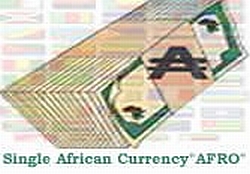Africa’s Currencies: Lessons from the European Union

 |
|
"Afro" the proposed name for Africa's single currency Photo courtesy
|
The African Union is now aiming at pooling all the continent’s currencies into a single currency by 2028. In the meantime, several regional monetary unions are on the drawing board, in addition to the two monetary unions that already exist, one de jure and the other de facto.
The premier and oldest of these unions is composed of the fourteen countries that belong to the Economic and Monetary Community of Central Africa and the West African Economic and Monetary Union, which both use the CFA franc. The second of these unions is composed of
To see why, consider
The naira was intended to bolster the country‘s independence by making it possible for the central bank to pursue its own monetary policy. It was also a matter of national pride. The thinking behind the new arrangement was that an independent and flexible monetary policy would serve the nation‘s interest better than a fixed exchange rate that tied the naira to the pound.
But the naira’s introduction quickly put an end to parity with the British pound. Government expenditure exceeded federal revenue, despite rapidly rising foreign-exchange earnings from oil exports after 1970. The federal government’s budget deficits were financed through foreign and domestic borrowing, and by printing money, which led to inflation and depreciation of the new currency. Today, it costs 220 naira to buy one British pound, which implies 15% annual average depreciation since 1973.
This depreciation would perhaps be justifiable had
In view of this experience,
Why? The smallest countries show no signs of fear of being swamped by Nigeria, by far the most populous country in the group (accounting for 155 million of the six countries’ 200 million people), especially as the new West African Central Bank is to be located in Accra, the capital of Ghana (24 million). Others, though, may fear the dilution of their sovereignty when the new Central Bank of the West African Monetary Zone takes over some of the policymaking responsibilities of national central banks. But that, of course, is the chief purpose of a monetary union.
When the West African Monetary Zone finally is established, the number of currencies in
The belief that sovereign national currencies, by enabling independent and flexible monetary policies, are the best way to foster economic and social development – the vision of
Indeed, the success of the European Union and of the euro since its launch in 1999 has made a strong impression in
By Thorvaldur Gylfason,
Professor of Economics,
